Renata Barradas Gutierrez
renatabarradas88@gmail.com
Washington D.C, United States
Renata earned a Bachelor’s Degree in International Relations from Tecnologico de Monterrey and two Certificates in Woman, Gender and Development and International Relations from The University of British Columbia. While working as Communications Coordinator in Cinco Panes y Dos Peces A.C., a Mexican nonprofit organization, she helped indigenous communities in isolated regions in Mexico to apply a Risk Prevention, Control and Management Plan. Simultaneously, Renata taught a certificate in Financing Strategies and Fundraising for nonprofits. Previously, she coordinated two international volunteer projects in Belgium at the Red Cross Center for Asylum Seekers and at the Asylum Seekers and at the Arthur Regniers Center for motor and brain handicapped people. Renata has volunteered in ten projects nationally and internationally concerning a wide range of topics such as: orphan children, Down's syndrome children, reforestation, Elkhorn Coral Planting, fundraising, and reconstruction. Through these experiences, she developed project coordination and implementation, fundraising, web development and research skills. Renata enjoys topics related to philanthropy and has a strong passion for poverty relief and refugees. As a result, from her passion in the nonprofit sector, she has cofounded Amarte A.C., and Hoor A.C., two Mexican nonprofit organizations.
Renata currently helps to support the information and knowledge management needs of the Global Disaster Preparedness Center (GDPC). This includes providing immediate support for data collection and analysis, maintaining and refining an effective knowledge management system for a state-of-the-art resource center, and piloting of complementary knowledge management initiatives.
Video
The Shelter Effect or how a safe home can change everything.Come and share your experiences here: www.facebook.com/TheShelterEffect
Report
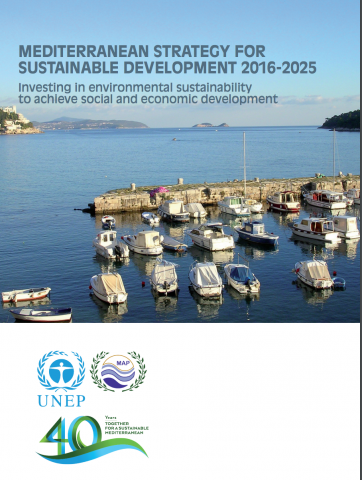
Each of the Labs form a thematic focus on which UNHCR is committed to innovating based on a request from a Division to collaborate, which may or may not be combined with a pre-identifi ed organization-wide need. Innovation Labs are a co-working space...
Assessment or evaluation
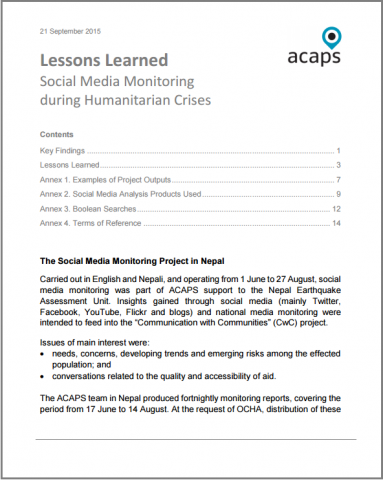
This document summarises the experiences of the pilot social media monitoring project set up to following the 25 April earthquake in Nepal, and draws out key lessons learned and recommendations. It was informed by a lessons learned workshop in Nepal ...
Case Study
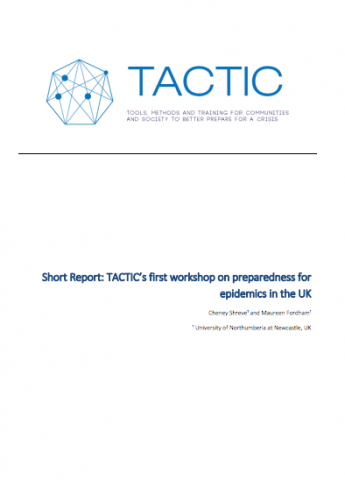
One of TACTIC’s overarching aims is to understand preparedness from a cross-boundary, ‘multi-hazard’ perspective. As a part of this effort, TACTIC partners are investigating floods, earthquakes, epidemics and terrorism through a series of case ...
Case Study
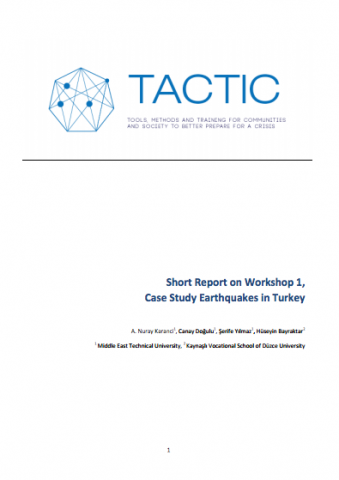
As stated in the DoW, the earthquakes case study in Turkey focuses on individual, community, and organizational preparedness for earthquakes, and the secondary hazards related to earthquakes (e.g., fires) and other hazards (e.g., floods, landslides, ...
Case Study
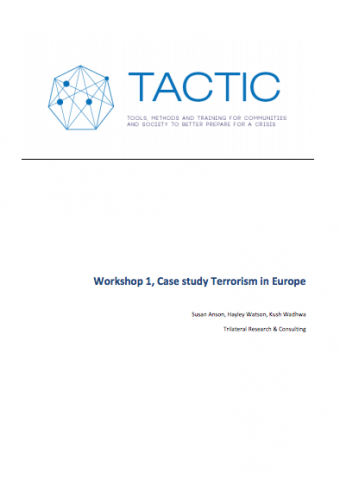
This report examines a case study on effective community preparedness towards an act of terror. It is increasingly recognised that terrorism is a global threat that needs to be prepared for (Lemyre et al., 2006). The impacts of terrorist attacks in r...
Case Study
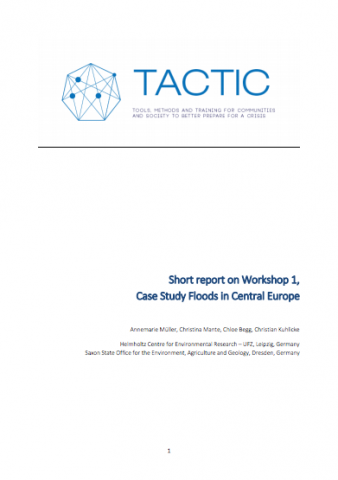
Floods are the most costly disasters (EEA 2010) in Europe. Although floods are quite common in many parts of Europe, they still pose a profound challenge to emergency and risk management agencies. This is particularly true in the large-scale river ba...
Report

The findings of this report highlight advantages of different disciplinary approaches for informing preparedness; some are well suited to risk assessment and others for informing risk management and preparedness. Rapid response to all of the hazards ...
Video
This brief animation produced in partnership with USAID’s Digital Development Lab explores the issue of access to mobile devices in terms of connectivity, affordability, and more.
